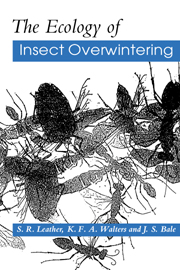1 - Introduction
Published online by Cambridge University Press: 16 September 2009
Summary
Although most insects in temperate climates spend a large proportion of their life in an overwintering stage (the small willow aphid, Aphis farinosa (Gmelin) (Homoptera: Aphididae), for example, spends 75 per cent of the year as an egg) the study of insect overwintering has, in many cases, been surprisingly neglected. Perhaps this is a reflection of the fact that many entomologists, like the majority of the insects they study, spend the long cold winter months carefully insulated from the outside world!
Why study overwintering?
The vast majority of the prodigious amount of literature concerning insects, and particularly the literature concerning those insects of economic importance (with which this book is mainly concerned) details investigations of the summer stages of the life cycle. This is, of course, understandable – the insects are present in large numbers during the summer (generally in the multiplicative stage of the life cycle) and this is, in general, the time when the damage to the crop becomes apparent. In addition, the majority of control measures are applied at or just before this time of the year. However, it is a sometimes forgotten fact that the size of the insect populations entering the overwintering stages, and the subsequent survival of these stages, play a major part in determining the population levels encountered in the following spring and summer. Although it has been stated that the literature on overwintering is extensive (Danks 1978), it has too often been of a superficial nature or confined to one specific area, generally that of cold-hardiness.
- Type
- Chapter
- Information
- The Ecology of Insect Overwintering , pp. 1 - 4Publisher: Cambridge University PressPrint publication year: 1993



